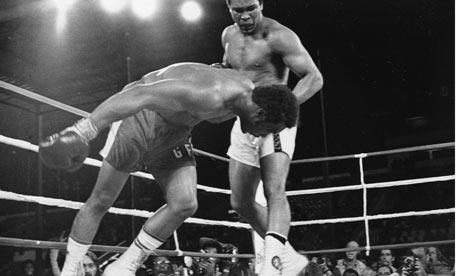
It is exactly 35 years since Muhammad Ali and George Foreman rumbled in the jungle on what those fortunate enough to be there reckon was the most memorable night of their lives.
Big George, who was a sullen and strangely insecure man in those days, was so demoralised by the eighth-round knockout that he did not fight again for 15 months. His aura was shattered and, although he rebuilt his career – especially when he came back in 1987 after 10 years out of the sport – the mental scars took a long time to heal.
Ali was the master of cruel put-downs. He called Sonny Liston "a big ugly bear". Joe Frazier was "a gorilla". And Foreman was characterised as "The Mummy', a sideshow joke of a fighter, with no intelligence and little talent, save that for knocking men out. Ali demeaned George in front of people who imagined they were celebrating the skills of two black men, bringing pride to all of them. Ali was blind to the wider picture, though, as he pursued every psychological advantage.
And none of the attendant writers I have spoken to down the years could compare the fight and all that surrounded it with anything else they'd covered, before or since. The rest of us have only our imagination and memory to rely on, or the splendid documentary When We Were Kings, a film that did not see the light of day until 20 years later because of a contractual dispute and, when it did appear, won an Oscar.
writers gathered around Ali in victory that storm-lashed October night, bathing in the light of his magnificence, Foreman was left to lick his wounds in private. He became yesterday's news in a twinkling, and he resented for years the way in which Ali had humiliated him, reducing him in stature from ogre to wrecked champion.
Yet this week, Foreman told a journalist, "I don't call him the best boxer of all time, but he's the greatest human being I ever met. Maybe I should go and see him. He's like a brother, we're that close." For a man whose ring name was just plain "Big", that was as big a statement of understanding and forgiveness you could wish for.
As for Ali, what blows he did take when not covering up on the ropes against Foreman were added to the thousands he had absorbed in a long, storied career that was remarkable as it wound down for his willingness to take unnecessary punishment. What few people outside his inner circle realised at the time was the extent of the cumulative damage. A combination of his ego and courage, and the inability of those around him to persuade him to protect his unnaturally strong chin, surely contributed to his slide into Parkinson's Syndrome.
No comments:
Post a Comment